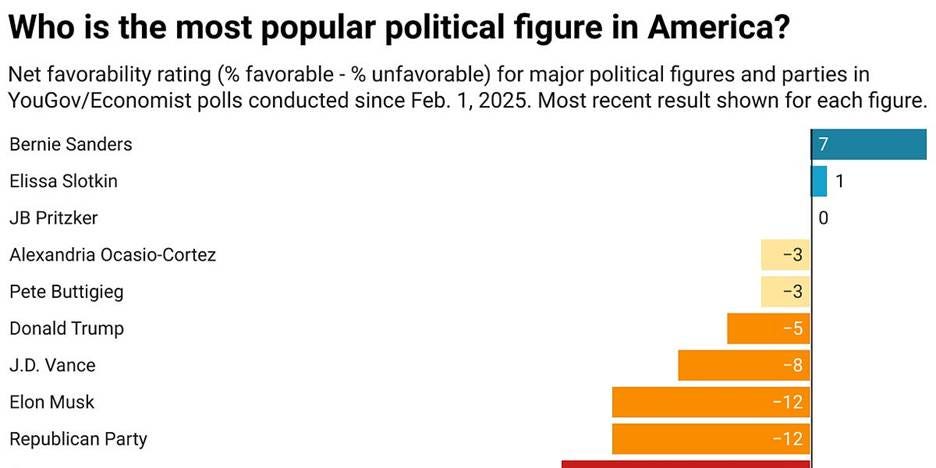Related Articles: Analysis of Zohran’s Policies and Mainstream Democrats and the Far Left
Richard Nixon and Jerry Voorhis at the time of their election. Source: WordPress Blog.
In California’s 12th Congressional District in 1946, the incumbent Democrat Jerry Voorhis—a steady, moderate lawmaker—was challenged by Republican newcomer Richard Nixon. To undermine Voorhis’s appeal, Nixon’s team launched an aggressive red-baiting campaign. They ran newspaper ads linking Voorhis to a more radical left-wing congressman, Vito Marcantonio, suggesting that Voorhis shared communist sympathies. In fact, one local newspaper even ran a dramatic spread titled “How Jerry and Vito voted”, driving home the message that Voorhis lurked on the far-left fringe.
The campaign didn’t stop there. Nixon’s operatives allegedly staffed phone banks to place anonymous calls to voters:
“Did you know Jerry Voorhis is a communist?”
By the time the dust settled, Voorhis was on the defensive, unable to shake the stigma. Nixon won by over 15,000 votes — a decisive victory directly fueled by painting Voorhis as dangerously far-left.
Socialists: A Strategic Analysis
The stunning victory of 33-year-old democratic socialist Zohran Mamdani in New York City's recent Democratic mayoral primary has provided Republicans with a political gift they intend to exploit ruthlessly. Within hours of former Governor Andrew Cuomo's concession, Republican strategists launched a coordinated messaging campaign designed to tie the entire Democratic Party to what they characterize as radical socialism. This article examines the GOP's tactical approach and explores how Democrats can—and should—respond to these inevitable attacks.
The Republican Strategy: Making Mamdani the Face of the Democratic Party
Republicans have wasted no time positioning Mamdani as the new face of the Democratic Party, employing a strategy that combines personal attacks with ideological fear-mongering. The National Republican Congressional Committee (NRCC) immediately labeled Mamdani a "socialist lunatic" and declared him "the new face of the Democratic Party". President Donald Trump escalated the rhetoric, posting on Truth Social that Democrats had "finally crossed the line" by elevating "a 100% Communist Lunatic".
Republicans catastrophizing about the consequences of a Mamdani primary win. Source: X.
The GOP's messaging strategy operates on multiple levels. First, they are attempting to nationalize Mamdani's victory by tying it to vulnerable House Democrats across the country. The NRCC spokesman Mike Marinella stated that "every vulnerable House Democrat will own him, and every Democrat running in a primary will fear him". This approach seeks to create political liabilities for Democrats in swing districts who must now either embrace or distance themselves from Mamdani's positions.
Second, Republicans are exploiting Mamdani's personal background and faith in ways that echo xenophobic themes. Conservative activist Charlie Kirk described Mamdani as "The Muslim socialist candidate for resentful immigrants who despise the West", while others have focused on his naturalized citizenship status and Muslim faith. This strategy aims to appeal to voters uncomfortable with America's changing demographic composition.
Third, the GOP is highlighting Mamdani's most controversial positions, particularly his views on Israel-Palestine, policing, and economic policy. Republicans have seized on his refusal to distance himself from the pro-Palestinian slogan "globalize the intifada" and his past support for defunding police initiatives. Rep. Elise Stefanik characterized him as a "radical, Defund-the-Police, Communist, raging Antisemite", demonstrating how Republicans plan to weaponize these positions.
The Broader Electoral Context
Republican strategists view Mamdani's victory as validation of their long-term strategy to paint Democrats as out-of-touch radicals. Veteran Republican strategist Colin Reed told Fox News that "the Democratic Party's trying to convince people that the tail is not wagging the dog, and they don't answer to the more extreme elements of their party. Now, that entire effort is undercut by a socialist winning handily in a bellwether election".
While previous elections and Trump made the general public more skeptical of extremist Republicans, the GOP has done a good job tying democrats to their extreme wing. Now the public views the democratic party as the more extreme. Source: Washington Post
This strategy has proven effective in recent election cycles, particularly in suburban districts where moderate voters have been receptive to messages about Democratic extremism. Republicans successfully used similar tactics in 2021 and 2022, contributing to Glenn Youngkin's gubernatorial victory in Virginia and helping the GOP retain competitive positions in purple states like Florida.
Rep. Mike Lawler, a New York Republican considering a gubernatorial run, told TIME that "I fundamentally believe he instantly becomes the face of the Democratic Party. Democrats are going to have to own or disavow the views he espouses, and if they own them, voters will not take kindly to them. If they disavow them, their base will revolt".
How Democrats Should—And Shouldn't—Respond
Democrats face a complex strategic challenge in responding to Republican attacks centered on Mamdani. Their response strategy will likely determine whether his victory becomes a political asset or liability for the party nationally.
What Democrats Should Do
1. Focus on Economic Populism Over Ideological Labels
Democrats should emphasize the economic themes that drove Mamdani's victory rather than defending socialist ideology. His campaign's focus on affordability—free public transportation, rent freezes, and childcare—resonated with voters struggling with high costs of living. As Vermont Senator Bernie Sanders noted, "In many respects, Mamdani's campaign exemplifies the direction the Democratic Party should pursue. The focus should not be on billionaire interests but rather on the desires of working-class individuals".
Despite being labeled a socialist, Bernie Sanders is one of the most favorable public figure of both parties. Source George Elliot Morris.
Research from Democratic data firm Blue Rose Research indicates that straightforward, populist messaging about affordability resonates with swing voters, similar to the most effective messages from Kamala Harris's 2024 campaign. Democrats should highlight this connection rather than allowing Republicans to define the conversation around ideological labels.
2. Distinguish Between Democratic Socialism and Communism
Democrats must clearly articulate the difference between democratic socialism—which operates within democratic institutions and preserves capitalist markets—and the communist systems Republicans invoke. Democratic socialism, as practiced in Scandinavian countries, maintains democratic governance while expanding social services and worker protections. This distinction matters to voters who may support specific policies while rejecting communist systems.
3. Highlight Local vs. National Relevance
Democrats should emphasize that mayoral races involve local issues that don't necessarily translate to national politics. Mamdani's focus on New York City's specific challenges—housing costs, transportation, and local governance—may not reflect broader Democratic Party positions on national issues.
4. Preemptively Address Antisemitism Claims
Given Republican attacks on Mamdani's Israel-Palestine positions, Democrats should proactively distinguish between legitimate criticism of Israeli policy and antisemitism. This requires careful messaging that supports Jewish Americans while defending the right to critique foreign policy positions.
What Democrats Should Avoid
1. Defensive Apologetics
Democrats should resist the temptation to distance themselves from Mamdani entirely, as this validates Republican framing that his positions are inherently problematic. As political scientist Thomas Alan Schwartz notes, Republicans have used the "socialist" label against Democrats for decades, regardless of the actual policy positions involved.
2. Ideological Purity Tests
The party should avoid forcing Democratic candidates to take positions on Mamdani's specific policy proposals, as this creates unnecessary divisions and allows Republicans to set the terms of debate.
3. Ignoring the Attacks
Some Democrats may hope the controversy will fade, but Republican investment in this messaging suggests sustained attacks. The party needs a proactive communication strategy rather than hoping the issue disappears.
4. The Risks of Inaction
Democrats who fail to respond effectively risk allowing Republicans to define them permanently as the party of radical socialism. Matt Bennett of the centrist Democratic organization, Third Way, warned that Mamdani's association with the Democratic Socialists of America is "perilous" and "is already being leveraged against us by Republicans".
The stakes extend beyond individual races. Republicans plan to use Mamdani as a foil in swing districts across the country, particularly in suburban areas where moderate voters might be receptive to arguments about Democratic extremism. Early evidence suggests this strategy may be working—some moderate Democrats like Rep. Laura Gillen have already begun distancing themselves from Mamdani, calling him "too extreme to lead New York City".
Learning from Past Responses
Democrats have faced similar challenges before and can learn from both successful and unsuccessful responses to Republican "socialist" attacks. President Biden's approach—directly confronting the label while emphasizing his support for capitalism—provides one model. In 2022, Biden dismissed critics calling him socialist as "idiots" while defending programs like Social Security and Medicare.
However, the party's broader response has been inconsistent. Some Democrats embrace progressive policies while others seek to distance themselves, creating confusion among voters about what the party actually stands for.
The Path Forward
The most effective Democratic response will likely combine several elements: clear economic messaging focused on affordability, principled distinctions between policy positions and ideological labels, and proactive communication that doesn't cede narrative control to Republicans.
Democrats should also recognize that Mamdani's victory reflects genuine voter concerns about economic inequality and cost of living that transcend ideological categories. Rather than apologizing for these concerns, the party should embrace them while distinguishing their solutions from the caricatures Republicans will inevitably create.
Ultimately, the Republican strategy of using Mamdani to attack Democrats nationwide will succeed only if Democrats allow it to. By responding with clear, confident messaging that emphasizes economic populism over ideological purity, Democrats can turn what Republicans intend as a liability into an opportunity to connect with working-class voters who share Mamdani's concerns about affordability and economic justice.
The 2026 midterm elections will provide the first major test of whether Republican attempts to weaponize Mamdani's victory prove effective. The Democratic response in the coming months will likely determine whether his surprising primary victory becomes a symbol of progressive energy or a cautionary tale about ideological overreach.
Notes: This is my own opinion and not the opinion of my employer, State Street, or any other organization. This is not a solicitation to buy or sell any stock. My team and I use a Large Language Model (LLM) aided workflow. This allows us to test 5-10 ideas and curate the best 2-4 a week for you to read. Rest easy that we fact-check, edit, and reorganize the writing so that the output is more engaging, more reliable, and more informative than vanilla LLM output. We are always looking for feedback to improve this process.
Additionally, if you would like updates more frequently, follow us on x: https://x.com/cameronfen1. In addition, feel free to send me corrections, new ideas for articles, or anything else you think I would like: cameronfen at gmail dot com.







